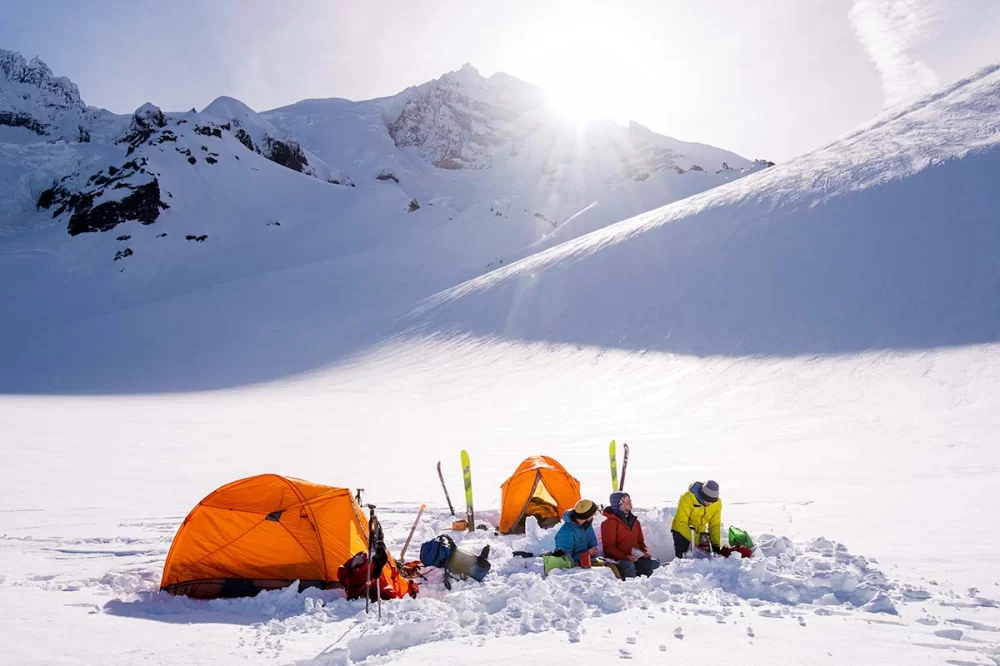Discover the best camping gear for cold-weather camping. Our guide covers the must-have camping equipment to stay warm, safe, and comfortable during winter camping trips.

The Best Camping Gear for Cold-Weather Camping: Must-Have Equipment
- 1. Cold-Weather Camping Gear Overview
- 2. Essential Winter Camping Equipment
- 3. Cold-Weather Camping Clothing
- 4. Real Winter Camping Experiences
- 5. How to Plan for Cold-Weather Camping
1. Cold-Weather Camping Gear Overview
Cold-weather camping offers a unique, rewarding experience, but it also requires specialized gear to ensure warmth, comfort, and safety. The right equipment is critical to your enjoyment and safety when camping in freezing temperatures. Whether you're venturing into snowy mountains or heading to a chilly national park, having the best cold-weather camping gear will help you brave the elements and make the most of your adventure.
Why You Need Special Cold-Weather Gear
In winter, the risks are higher, and the conditions more demanding. To stay safe in extreme cold, you need gear that’s built to handle these conditions. From durable tents that withstand snow to sleeping bags designed for sub-zero temperatures, having the right tools can make or break your trip. These items ensure that you remain warm, dry, and well-prepared for whatever Mother Nature throws your way.
2. Essential Winter Camping Equipment
Winter camping requires a solid checklist of essentials. Here’s a breakdown of the best camping gear for cold-weather camping:
1. Insulated Sleeping Bags
The most important item in your gear arsenal is an insulated sleeping bag. For cold-weather camping, choose a sleeping bag rated for temperatures lower than what you expect to encounter. Look for high-quality down or synthetic insulation to help trap heat. A sleeping bag liner can also add extra warmth.
2. Four-Season Tent
Not all tents are made for winter. A four-season tent is designed to handle snow, high winds, and cold conditions. It provides more insulation and better protection from the elements. Look for tents with reinforced poles and snow skirts for added wind and snow resistance.
3. Insulated Sleeping Pads
Sleeping on the cold ground is a recipe for discomfort. To prevent heat loss to the ground, you’ll need an insulated sleeping pad. High R-value sleeping pads are perfect for winter camping, as they provide insulation and cushioning, keeping you comfortable even on the coldest nights.
4. Winter-Ready Stoves
Cooking in winter requires a reliable stove that works well in low temperatures. Canister stoves can struggle in extreme cold, so consider a liquid-fuel stove for better performance. Don’t forget extra fuel and a windproof setup for cooking in the snow.
3. Cold-Weather Camping Clothing
Layering is essential for staying warm during winter camping. The right clothing will help you regulate your body temperature while protecting you from the cold. Below are the key components of cold-weather camping clothing:
1. Base Layer
The first layer should be moisture-wicking, such as merino wool or synthetic materials. This helps to keep sweat away from your skin, preventing you from getting chilled. Avoid cotton as it retains moisture, which can make you cold.
2. Insulating Layer
The second layer should be designed to trap heat. Fleece, down, or synthetic jackets are excellent choices for insulating. These materials are lightweight but highly effective in keeping you warm during your outdoor adventures.
3. Outer Layer
Your outer layer should be waterproof and windproof. Look for jackets and pants made from high-quality Gore-Tex or other waterproof fabrics. These layers will protect you from snow, rain, and freezing winds, ensuring that you stay dry and warm.
4. Footwear and Accessories
Insulated boots, warm socks, and gloves are non-negotiable in cold-weather camping. Wool or synthetic socks, along with waterproof boots, will keep your feet dry and warm. Also, a warm hat, neck gaiter, and gloves will protect your extremities from frostbite.
4. Real Winter Camping Experiences
Nothing compares to the thrill of winter camping, and real-life stories from adventurers who’ve embraced the cold can provide great insight into how the right gear makes all the difference:
1. Winter Camping in the Canadian Rockies
Emily and her partner decided to tackle the Canadian Rockies in winter, equipped with high-quality four-season tents, down sleeping bags, and winter-rated stoves. Despite facing strong winds and temperatures dropping well below freezing, they were warm and comfortable throughout their trip, thanks to their gear. Their journey was challenging but unforgettable, and they highly recommend investing in the best cold-weather camping gear for those serious about winter exploration.
2. Exploring the Swiss Alps in the Snow
John, an experienced winter camper, went on a solo adventure in the Swiss Alps. Armed with a high-performance winter sleeping bag and a weather-resistant tent, he was able to embrace the stunning snowy landscape. The combination of well-insulated clothing, durable boots, and reliable winter camping equipment helped him overcome the challenges of extreme cold, making the trip an incredible success.
5. How to Plan for Cold-Weather Camping
Planning a successful cold-weather camping trip requires more than just the right gear. Here’s how to prepare:
1. Research the Weather and Terrain
Before heading out, always check the weather forecast and plan for extreme conditions. Consider the terrain—mountainous areas can present additional challenges in the winter, so make sure you’re fully prepared for snow and ice.
2. Choose the Right Campsite
Pick a campsite that is safe for winter camping. Look for sites that provide shelter from wind, such as in forests or near rock formations. Avoid exposed areas where winds can be stronger and conditions harsher.
3. Safety Precautions
Winter camping can be dangerous if you’re not properly prepared. Always carry extra fuel, food, and water. Additionally, let someone know your trip plans and expected return date, and consider carrying a GPS and emergency beacon for added safety.
BWCA Campsite #1027
Schroeder Township, MN 55604, USA
Visit Location PageMontreat Campground
99999 Calvin Trail, Black Mountain, NC 28711, USA
Visit Location Page